Fast Facts
- When: 5th August 2023 to 25th May 2024
- Where: Various, Final at Wembley Stadium, London
- Watch: BBC & ITV
- Official Website: The FA
The long road to the FA cup final begins in early August when the qualifying rounds take place. The first round proper is played in November, with the Premier League clubs joining in the third round in January.
From North Ferriby to Southampton, Eastbourne Town to West Ham United, there are a total of 732 clubs all the way down to the tenth tier of the English football pyramid involved. After nearly 10 months and 731 ties, the FA Cup will reach its traditional Wembley finale in May where the two finalists will compete on the famous turf to lift the FA Cup from the Royal Box.
This season sees the 143rd edition of the oldest and most popular club football competition in the world. Still hugely popular with fans of clubs up and down the country, there is usually a number of offers surrounding matchdays, especially during the latter stages. We will highlight the best of these below.
Existing Customer Free Bets & Money Back Offers
Please Note: This event has now ended.
Stats Articles
Event Stats
Last 10 FA Cup Finals: 2014 to 2023
| Date | Winner | Score | Runner-Up |
|---|---|---|---|
| 3rd June 2023 | Manchester City | 2-1 | Manchester United |
| 14th May 2022 | Liverpool | 0-0 AET, 6-5 pens | Chelsea |
| 15th May 2021 | Leicester City | 1-0 | Chelsea |
| 1st August 2020 | Arsenal | 2-1 | Chelsea |
| 18th May 2019 | Manchester City | 6-0 | Watford |
| 19th May 2018 | Chelsea | 1-0 | Manchester United |
| 27th May 2017 | Arsenal | 2-1 | Chelsea |
| 21st May 2016 | Manchester United | 2-1 | Crystal Palace |
| 30th May 2015 | Arsenal | 4-0 | Aston Villa |
| 17th May 2014 | Arsenal | 2-2, 3-2 AET | Hull City |
Schedule
- Qualifying Rounds: Saturday 5th August to Saturday 14th October 2023
- First Round: Saturday 4th November 2023
- Second Round: Saturday 2nd December 2023
- Third Round: Saturday 6th January 2024
- Fourth Round: Saturday 27th January 2024
- Fifth Round: Wednesday 28th February 2024
- Quarter-Finals: Saturday 16th March 2024
- Semi-Finals: Saturday 20th April 2024
- Final: Saturday 25th May 2024, kick-off TBC
Schedule is subject to change, date shown is the main date but games will take place around this
About the FA Cup
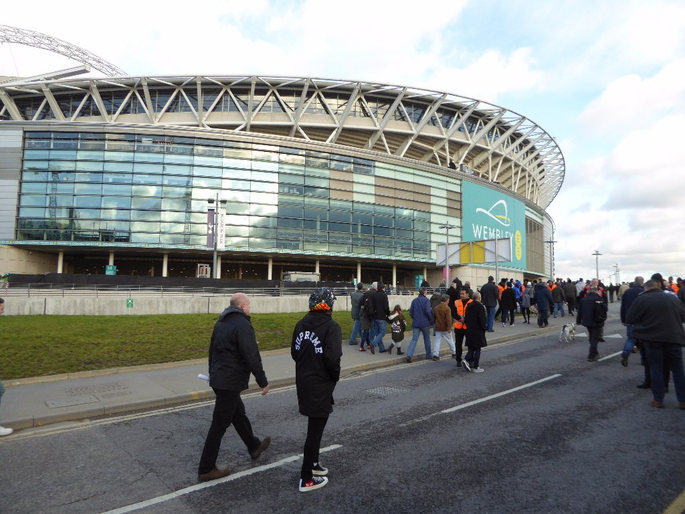
The FA Cup is the oldest cup competition in the world. Running since 1871, it has widely been regarded as one of the pinnacles of the English game for almost one hundred and fifty years.
With hundreds of teams entering, the FA Cup is large enough to require some preliminary qualifying rounds to be played before the competition proper gets underway. That’s no major surprise, when you consider that the tournament is open to any team in the top ten divisions of the English football pyramid. This provided they’ve participated in one of the FA Cup, FA Vase or FA Trophy in the previous season.
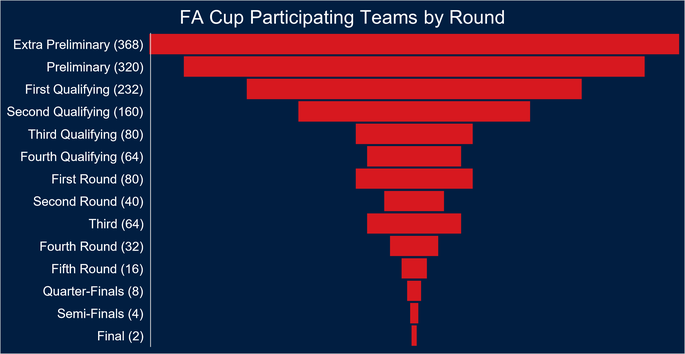
The Preliminary Qualifying Rounds begin in August, with teams from rungs eight, nine and ten of the English footballing ladder going up against each other. They are joined in September by teams from levels six and seven in what are the first and second qualifying rounds.
The first round of the competition proper starts in November with teams from League One and League Two added into the draw to see eighty sides in total competing. The second round sees no additional teams join meaning that twenty teams move on to the third round. It’s the third round that sees the addition of the Premier League and Championship clubs, which receive a bye to that stage every season.
The Third Round is very much seen as one of the highlights of the Cup. It’s the first chance for a team potentially as low as the tenth tier of English football to meet a team from the top-tier. Over the years there have been numerous upsets at this stage and it’s often referred to as the ‘Magic of the FA Cup’ for this exact reason. It’s also led to the coining of the phrase ‘Giant Killing’, meant to represent when a lowly side defeats one of the top leagues.
Rounds are played out in a knockout format and any games that are tied after the ninety minutes requiring a replay at the ground of the opposition to the home team. Extra time and penalties are introduced if needed at the end of the replay if it too is drawn after 90 minutes. From the 2018/19 season, replays do not take place from the fifth round onwards, where drawn matches will go straight to extra time and then penalties if required.
The semi-finals and final are all played at Wembley Stadium, often with the final being played on the weekend following or prior to the last games of the Football League and Premier League seasons. It used to be the case that the semi-finals were played at a neutral ground, with the likes of Old Trafford and Villa Park having been used in the past. However, the building of the new version of Wembley led the FA to moving both semi-finals there in order to generate revenue.
The Formation of the FA Cup
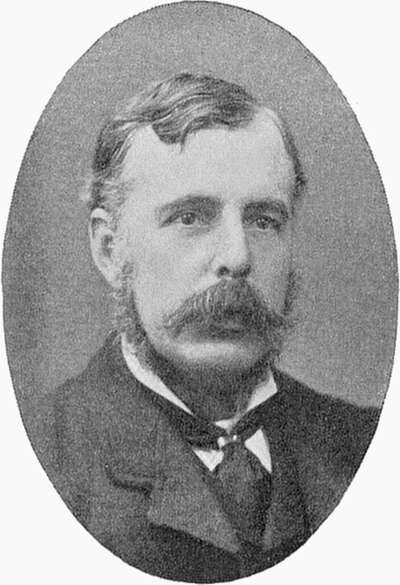
C.W. Alcock from photo by E. Hawking & Co., Brighton via Wikimedia Comomons
The Football Association Challenge Cup, to give the competition its full name, was originally created in order to give teams the chance to play matches according to the newly cemented laws of the Football Association.
Prior to the FA being formed, teams would play their own rules of football depending on where in the country they were based. After the FA wrote the Laws of the Game, however, teams started to play roughly the same game as each other, even if not all of the associations around the country adhered to them immediately. With every passing year more and more teams began to play the FA’s rules, but there was still no structured manner for them to do so.
Enter C.W. Alcock, the Secretary of the FA in 1871 who suggested that teams that were part of the Football Association should play in a Challenge Cup against each other. By November of that year the cup was up and running, though only thirteen games were played in the inaugural competition.
Though teams were keen to get involved in the new tournament, it wasn’t an immediate hit with supporters. Just two thousand people turned up to watch Wanderers go up against Royal Engineers in a match at the Kennington Oval.
Those first finalists would maintain a close association with the competition over the next two years, with Wanderers defending their trophy in 1872 by beating Oxford University, whilst Royal Engineers played Old Etonians in 1873 and beat them 2-0 after a replay.
The Modern Format Develops and Soaring Interest
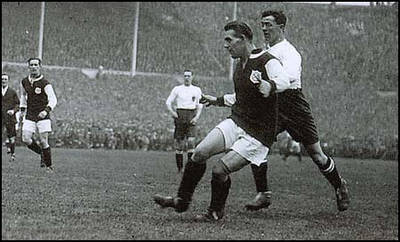
Image via Wikimedia Commons
By the time the 1888-1889 season came around, the number of teams hoping to be involved in the FA Cup had increased dramatically. As a result, the tournament began to take on a format more similar to we know today. As an example, qualifying rounds were introduced to separate the wheat from the chaff, with the most successful sides joining in in the fourth qualifying round.
Just as teams were starting to be more enamoured with the competition, so too were supporters. In fact, it’s believed that more than 100,000 people turned up to watch non-league Tottenham Hotspur take on Sheffield United in the 1901 final at Crystal Palace.
Just as the Football League’s formation led to both teams and supporters becoming more used to the idea of sides playing in a structured competition, so too did the moving of the final of the competition to Wembley in 1923. It became the FA Cup’s home and gave it an added sense of importance, especially given that it was suspended during the First World War and required a jump-start.
By the mid-1920s, teams in the top two tiers of football in England got a bye to the later rounds of the tournament for the first time – a practice that would begin to add to the competition’s folklore in later years. The FA Cup was also suspended for the Second World War, with a curious set of coincidences meaning that the final game before the suspension and the first game after it both ended 4-1.
Substitutions and Replays
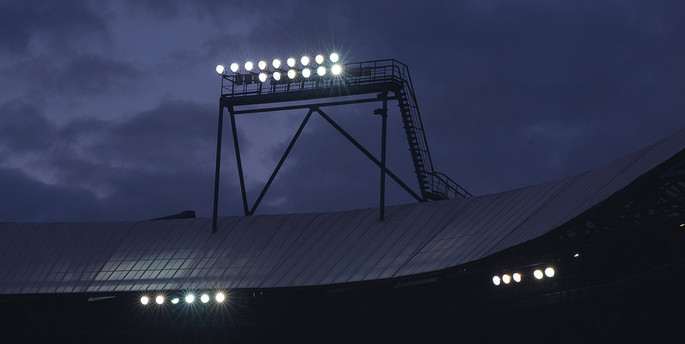
Though the FA Cup had slipped into something of a rhythm by the time the post-wars rolled around, there were still plenty of tweaks to the format that needed to come in in order for it to be more like the competition that we know and love today. One such example occurred in the 1966-1967 season when substitutes were used for the first time.
The decision to allow teams to change a player came about because in five of the finals between 1957 and 1965 the number of players on the field was reduced as a result of breaking a bone.
Though there had been other tweaks such as the use of floodlights, it wasn’t until the 1990s that the next major changes to the rules came about. A fourth round game between Arsenal and Leeds United ended up being played three times, simply because of the Football Association’s rule that a drawn match needed to be replayed. As a result, The FA confirmed that ties would be decided by extra time and penalties at the conclusion of the first replay.
By 2000 the FA decided that having replays for the semi-finals and final were unfair to supporters who had paid a decent chunk of money to watch them. Instead, extra time and penalties would be used to decide the winner of the match and stop fans from needed to pay twice to watch the match bdecided. The FA continued to monitor the competition’s format over the years that followed, abandoning replays in the quarter-final stage from the 2016-2017 season onwards, shifting this back to the fifth round from 2018/19.
The Hillsborough Disaster
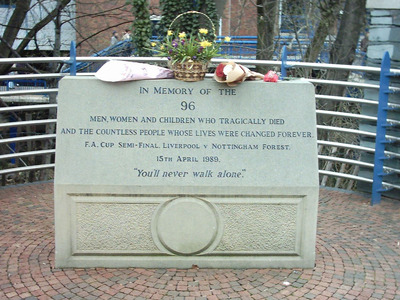
By Superbfc, Wikimedia Commons
It’s impossible to talk about the FA Cup without mentioning 1989’s Hillsborough Disaster. It occurred during the semi-final match between Liverpool and Nottingham Forest, which was hosted at the neutral ground of Hillsborough in Sheffield.
Despite the fact that Tottenham supporters had been involved in a crush eight years before at the same venue, the Football Association felt it was acceptable to hold the match between the two giants of the game there. It was later discovered that the stadium didn’t have a valid safety certificate for the hosting of the match, which was one of a litany of failures from both the game’s governing body and the police that would lead to the deaths of ninety-six Liverpool supporters.
Afterwards, the authorities had incorrectly blamed fans for the disaster, even changing witness statements to support this. The inquest returned verdicts of Accidental Death, which Liverpool fans refused to acknowledge. Regardless, this stood until another inquest was held more than twenty years later, at last finding that the 96 were unlawfully killed.
It was the worst sporting disaster on British soil and the resulting report into the matter by Lord Justice Taylor lead major changes being introduced to British football, including the change to all-seater stadia.
The New Wembley Stadium
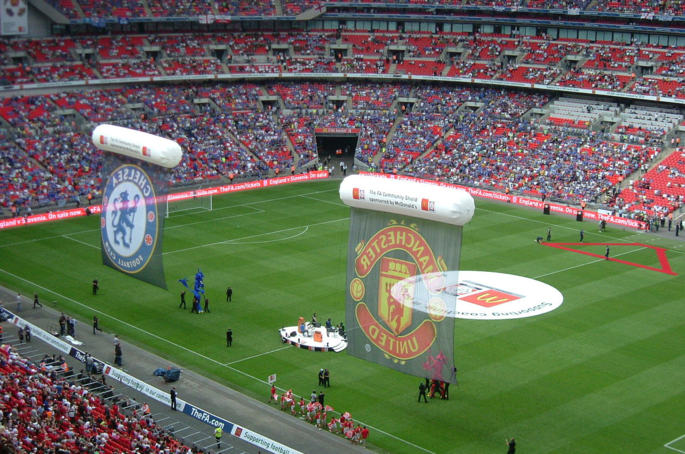
In 2000, the original Wembley was demolished after a decision to build a more up-to-date version of the stadium was taken. The FA Cup final was moved to the Millennium Stadium in Cardiff, with Liverpool winning the first and last finals played there in 2001 and 2006.
In 2007 the tournament returned to Wembley and, in another piece of delightful symmetry, Chelsea, who had beaten Aston Villa to win the last FA Cup final in the old Wembley, beat Manchester United 2-1 to win it for the first time at the new version of the stadium. They then went on to win it three more times over the following five seasons.
The FA Cup Winner’s Reward

The team that wins the FA Cup is not only rewarded with the trophy but also the ability to play in the FA Community Shield, which is the season curtain-raiser between the FA Cup winner and the team that won the Premier League. If the league and cup winner happens to be the same team then the FA Cup winners play against the Premier League runner-up.
The team that wins the FA Cup is also given a place in the following season’s Europa League tournament, unless they have already qualified for either it or the Champions League courtesy of their Premier League finishing position. In that case, the Europa League place is given to the highest placed team in the top-fight.
The trophy that the FA Cup winners lift is actually in three parts, the trophy itself, a lit and the stand. The original FA Cup, known as the ‘Little Tin Idol’, was stolen in 1895. The replacement was copied by Manchester United in 1910 and this helped the FA to realise that they didn’t own the rights to it and couldn’t stop any old team from creating their own copy of the trophy.
A new trophy was commissioned the following season and that’s the one that teams lift nowadays. The designers were Fattorini and Sons and they included a silver band that runs around the base which has the winning side’s name engraved on it.
Interesting FA Cup Facts
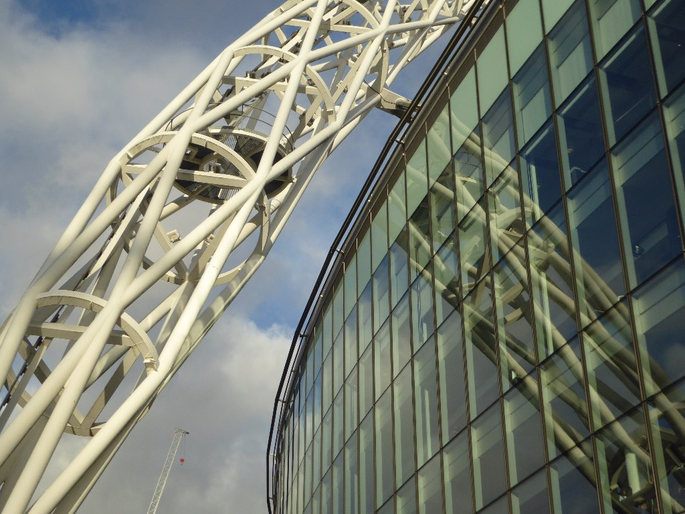
Arsenal are the most successful team in the Cup’s history, winning it on fourteen different occasions. Their most successful spell came in the early 2000s, winning it six times in fifteen years. Arsenal also jointly hold the record for the most final appearances with twenty one, alongside Manchester United. It probably comes as little surprise to hear that Arsenal manager Arsene Wenger is the most successful manger, with seven wins to his name.
There are interesting facts about the FA Cup that don’t involve Arsenal, of course. Here’s a look at some of the better ones:
- The title has been won three times consecutively by two teams: Wanderers and Blackburn Rovers
- Wanderers were the most successful finalists, having reached the last game of the competition on five occasions and winning it each time
- Leicester were the ‘most unlucky’ side, having appeared in four finals without winning prior to their 2021 triumph
- Manchester United have been runners-up in nine finals, one more than both Chelsea and Everton with eight final losses
- Two teams have scored three times in the FA Cup final only to still lose: Bolton Wanderers in 1953 and West Ham United in 2006
- Ashley Cole won the competition seven times as a player for both Arsenal (3) and Chelsea (4)
- Didier Drogba scored goals in four finals, all for Chelsea, which is a record
